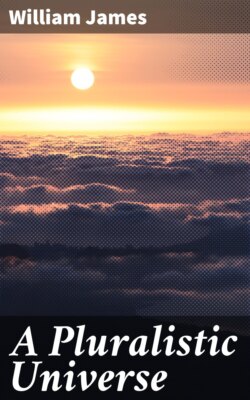A Pluralistic Universe

Реклама. ООО «ЛитРес», ИНН: 7719571260.
Оглавление
William James. A Pluralistic Universe
A Pluralistic Universe
Table of Contents
LECTURE I. THE TYPES OF PHILOSOPHIC THINKING 1
LECTURE II. MONISTIC IDEALISM 41
LECTURE III. HEGEL AND HIS METHOD 83
LECTURE IV. CONCERNING FECHNER 131
LECTURE V
LECTURE VI. BERGSON AND HIS CRITIQUE OF INTELLECTUALISM 223
LECTURE VII. THE CONTINUITY OF EXPERIENCE 275
LECTURE VIII. CONCLUSIONS 301
NOTES 333. APPENDICES. A. THE THING AND ITS RELATIONS 847. B. THE EXPERIENCE OF ACTIVITY 870. C. ON THE NOTION OF REALITY AS CHANGING 895. INDEX 401. LECTURE I
THE TYPES OF PHILOSOPHIC THINKING
LECTURE II
MONISTIC IDEALISM
LECTURE III
HEGEL AND HIS METHOD
LECTURE IV
CONCERNING FECHNER
LECTURE V
THE COMPOUNDING OF CONSCIOUSNESS
LECTURE VI
BERGSON AND HIS CRITIQUE OF INTELLECTUALISM
LECTURE VII
THE CONTINUITY OF EXPERIENCE
LECTURE VIII
CONCLUSIONS
NOTES
LECTURE I
LECTURE II
LECTURE III
LECTURE IV
LECTURE V
LECTURE VI
LECTURE VII
LECTURE VIII
APPENDICES
APPENDIX A. THE THING AND ITS RELATIONS[1]
I
II
III
IV
V
book, any table, may fall into the relation, which is created pro hac vice, not by their existence, but by their casual situation. It is just because so many of the conjunctions of experience seem so external that a philosophy of pure experience must tend to pluralism in its ontology. So far as things have space-relations, for example, we are free to imagine them with different origins even. If they could get to be, and get into space at all, then they may have done so separately. Once there, however, they are additives to one another, and, with no prejudice to their natures, all sorts of space-relations may supervene between them. The question of how things could come to be, anyhow, is wholly different from the question what their relations, once the being accomplished, may consist in
VI
APPENDIX B
THE EXPERIENCE OF ACTIVITY[1]
APPENDIX C
ON THE NOTION OF REALITY AS CHANGING
INDEX
INDEX TO THE LECTURES
ARISTIDES, 304. BAILEY, S., 5
BRADLEY, F.H., 46, 69, 79, 211, 220, 296
CAIRD, E., 89, 95, 137. CATO, 304
CHESTERTON, 203, 303
GREEN, T.H., 6, 24, 137, 278. HALDANE, R.B., 138
HODGSON, S.H., 282
HUME, 19, 267
JACKS, L.P., 35. JOACHIM, H., 121, 141. JONES, H., 52. KANT, 19, 199, 238, 240. LEIBNITZ, 119
LOTZE, 55, 120. LUTHER, 304
MILL, J.S., 242, 260
MYERS, F.W.H., 315
PAULSEN, 18, 22
PHOCION, 304
RITCHIE, 72
SOCRATES, 284
SPINOZA, 47
TAYLOR, A.E., 76, 139, 212
WELLS, H.G., 78
Отрывок из книги
William James
Hibbert Lectures at Manchester College on the Present Situation in Philosophy
.....
From a pragmatic point of view the difference between living against a background of foreignness and one of intimacy means the difference between a general habit of wariness and one of trust. One might call it a social difference, for after all, the common socius of us all is the great universe whose children we are. If materialistic, we must be suspicious of this socius, cautious, tense, on guard. If spiritualistic, we may give way, embrace, and keep no ultimate fear.
The contrast is rough enough, and can be cut across by all sorts of other divisions, drawn from other points of view than that of foreignness and intimacy. We have so many different businesses with nature that no one of them yields us an all-embracing clasp. The philosophic attempt to define nature so that no one's business is left out, so that no one lies outside the door saying 'Where do I come in?' is sure in advance to fail. The most a philosophy can hope for is not to lock out any interest forever. No matter what doors it closes, it must leave other doors open for the interests which it neglects. I have begun by shutting ourselves up to intimacy and foreignness because that makes so generally interesting a contrast, and because it will conveniently introduce a farther contrast to which I wish this hour to lead.
.....